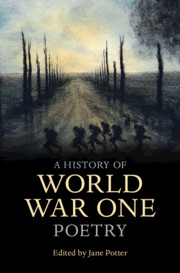Book contents
- A History of World War One Poetry
- A History of World War One Poetry
- Copyright page
- Dedication
- Contents
- Illustrations
- Contributors
- Acknowledgements
- Introduction
- Part I Literary Contexts
- Part II Nations and Voices
- Part III Poets
- Chapter 20 Non-Combatants
- Chapter 21 Edward Thomas (1878–1917)
- Chapter 22 Guillaume Apollinaire (1880–1918)
- Chapter 23 Siegfried Sassoon (1886–1967) and Edmund Blunden (1896–1974)
- Chapter 24 Anna Akhmatova (1889–1966)
- Chapter 25 Mary Borden (1886–1968)
- Chapter 26 Georg Trakl (1887–1914)
- Chapter 27 Isaac Rosenberg (1890–1918)
- Chapter 28 Ivor Gurney (1890–1937)
- Chapter 29 Wilfred Owen (1893–1918)
- Chapter 30 David Jones (1895–1974)
- Part IV
- Bibliography
- Index
Chapter 27 - Isaac Rosenberg (1890–1918)
from Part III - Poets
Published online by Cambridge University Press: 18 January 2023
- A History of World War One Poetry
- A History of World War One Poetry
- Copyright page
- Dedication
- Contents
- Illustrations
- Contributors
- Acknowledgements
- Introduction
- Part I Literary Contexts
- Part II Nations and Voices
- Part III Poets
- Chapter 20 Non-Combatants
- Chapter 21 Edward Thomas (1878–1917)
- Chapter 22 Guillaume Apollinaire (1880–1918)
- Chapter 23 Siegfried Sassoon (1886–1967) and Edmund Blunden (1896–1974)
- Chapter 24 Anna Akhmatova (1889–1966)
- Chapter 25 Mary Borden (1886–1968)
- Chapter 26 Georg Trakl (1887–1914)
- Chapter 27 Isaac Rosenberg (1890–1918)
- Chapter 28 Ivor Gurney (1890–1937)
- Chapter 29 Wilfred Owen (1893–1918)
- Chapter 30 David Jones (1895–1974)
- Part IV
- Bibliography
- Index
Summary
The poet/painter Isaac Rosenberg‘s poverty, education, and Jewish upbringing made him an outsider, yet this experience equipped him to cope with the unforeseen horror of war in the trenches: ‘I am determined that this war, with all its powers for devastation, shall not master my poetry.’ At first overshadowed by Brooke, Sassoon, and Owen, Rosenberg, whose background and poetic achievement insistently challenged contemporary judgements, increasingly symbolised those outside the established cultural canons. It was the poets who read and absorbed his work; and those of the next war who found in him an alternative voice which spoke to them. In the 1950s/60s that difference of approach, which had seemingly marginalised Rosenberg, now interested younger poets and eventually critics and the wider public. The originality and strength of his poetry were rooted in the struggle with the opposing elements of his life, which did not follow the conventions of any role he played: East End Jew, poet, painter or soldier.
- Type
- Chapter
- Information
- A History of World War One Poetry , pp. 441 - 456Publisher: Cambridge University PressPrint publication year: 2023

